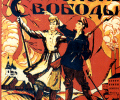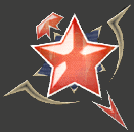Soviet Units
Buildings
Soviet architecture is very modern, using poured concrete to create solid cubic shapes. This progressive design captures the Revolutionary spirit of the age. Stalin is determined to create a world-class Communist state, and the building work represents this vision.
 Command
Command Centre
 Soviet
Soviet Barracks
 Air
Air Tower
 Early
Early Factory
 Tchelyabinsk
Tchelyabinsk Factory
 Factory
Factory #183
 Mine
Mine Field
 Tank
Tank Traps
 Guard
Guard Towers
 Concealed
Concealed Pillboxes
 Back
Back
Command Centre
Tech:
StartCost:
2500Build Time:
45 secsBuilt By:
DozerHealth:
10000Armour:
ConcreteMaximum:
1The command center is the core of your war effort. If is the command and control center that directs the whole battlefield. From here you can construct dozers, recruit basic soliders and fund partisans behind enemy lines. There can only be one command centre at a time and it cannot be sold, and so it is essential to have spare dozers in case it is lost. The command center coordinates the battle and as such enables the minimap. However the Red Army is thrown into chaos by the outbreak of hostilities and so you need to reorganise Stavka before this becomes available.
 Back
Back
Soviet Barracks
Tech:
StartCost:
1200Build Time:
8 secsBuilt By:
DozerHealth:
500Armour:
[ none ]Industrial Power:
-2Barracks train all infantry. They are rallying points and allow for the distribution of supplies, including spare parts and medical supplies. Infantry can enter the barracks to be healed from their wounds while tanks can also return to them for repairs. Since they drain supplies they have a cost to the overall economy. Soviet barracks are simple tent complexes which can be rapidly assembled for a low cost. This allows them to be constructed as the front line advances to keep reinforcments flowing to the battle.
 Back
Back
Air Tower
Tech:
StartCost:
5500Build Time:
20 secsBuilt By:
DozerHealth:
7500Armour:
[ none ]Industrial Power:
-5The air tower co-ordinates all Red Air Force planes in the region. They can requision fighter patrols, recon sweeps, bombing strikes and interdiction by close air support. Although they do not build any aircraft directly they have a constant drain on the economy, assigning supplies and replacements to the squadrons assisting the forces in their theatre.
 Back
Back
Early Factory
Tech:
StartCost:
15000Build Time:
15 secsBuilt By:
DozerHealth:
7500Armour:
[ none ]Industrial Power:
+6Maximum:
2These factories represent Soviet light industry that was not evacuated at the start of hostilities. They provide a marshalling yard for the vast reserves of obsolete equipment the Red Army had at its disposal in these early stages. They also produce light vehicles and artillery. Later on, once the relocation to the Urals is complete, they can be retooled to produce more advanced light vehicles at a much more impressive rate.
 Back
Back
Tchelyabinsk Factory
Tech:
Level 3Cost:
15000Build Time:
60 secsBuilt By:
DozerHealth:
7500Armour:
ConcreteIndustrial Power:
+12Maximum:
2The Tchelyabinsk plants offer a wide variety of tanks for production. They represent industrial capacity packed up and shipped wholesale to the Urals mountains, far outside the reach of enemy bombers. They are geared for mass production, often with existing designs upgraded slightly and with greatly reduced costs. Red Army thinking favours this itterative approach over radical redesigns of tanks that have been proven to work effectivly and this brings significant bonuses as production lines are streamlined.
 Back
Back
Factory #183
Tech:
Level 3Cost:
15000Build Time:
60 secsBuilt By:
DozerHealth:
7500Armour:
ConcreteIndustrial Power:
+12Maximum:
2The #183 industrial complex is a dedicated medium tank plant. It is devoted to mass producing the T-34 tanks at ever increasing rates. This specialisation makes it less versatile than the Tcheylabinsk plants but it can build the more advanced versions of the T-34 which generic plants cannot handle.
 Back
Back
Mine Field
Tech:
StartCost:
5000Build Time:
45 secsBuilt By:
EngineerA mine field is a delaying weapon. It is invisible to most units and can be used to create a deadly trap for uncautious enemy armour. While it does no real damage to enemy tanks, the mines will disable any armoured vehicle that rolls over them, blasting off tracks, stunning the crew and generally causing mayhem and confusion. When combined with concealed anti-tank guns they can create deadly kill-zones where disabled enemy tanks are then counter-attacked and destroyed without being able to fire a single shot.
 Back
Back
Tank Traps
Tech:
StartCost:
1600Build Time:
30 secsBuilt By:
EngineerTank traps are peices of metal welded into self-righting obstacles. They are hard to destroy quickly and are impossible to drive over with a tank. Thus they are a cheap and effective means to block enemy movements. While creating a complete barrier across a large area is too costly to be practical, they are great for blocking off streets or funneling enemy troops into mine fields or concealed defences as they try to bypass them.
 Back
Back
Guard Towers
Tech:
StartCost:
1100Build Time:
7 secsBuilt By:
EngineerHealth:
500Armour:
WoodThese Guard Towers are designed to give an observer good views over the surrounding terrain. They are also equipped with a machinegun and so can give good protection against infantry, especially infiltrators such as partisans who operate without heavy support.
 Back
Back
Concealed Pillboxes
Tech:
StartCost:
1200Build Time:
8 secsBuilt By:
EngineerHealth:
2000Armour:
LightPillboxes are light concrete bunkers for infantry to hide in. They use camouflage netting to conceal themselves allowing the infantry inside to launch supprise attacks on passing enemy troops from relative safety. While they are concealed to some extent, they will become obvious to anyone who gets close enough, even units who cannot normally detect stealth. Likewise, the concrete will give limited cover to the infantry inside, but they cannot be expected to withstand a sustained assault.
